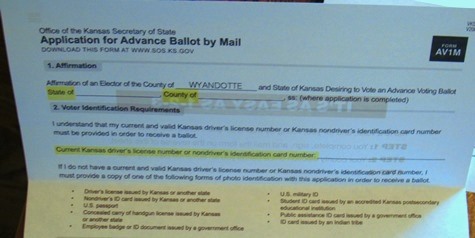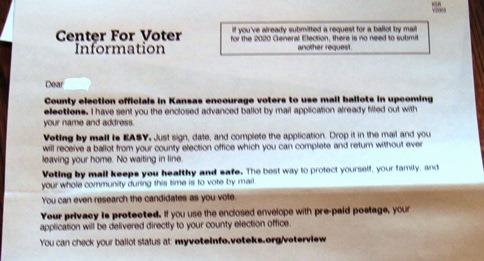The U.S. House of Representatives today voted 257 to 150 to pass a $25 billion bill that would stop cuts to the U.S. Postal Service.
The bill prohibits the Postal Service from implementing any changes to the operations or service levels in effect on Jan. 1, 2020; requires the Postal Service to treat all election mail as first-class mail; and provides $25 billion in emergency funding to the Postal Service. The bill next goes to the Senate for approval.
Critics alleged that the changes being implemented, such as removing processing machines, cutting overtime and eliminating some postal boxes, was slowing down the mail before the fall elections.
Voting for House Resolution 2015 was U.S. Rep. Sharice Davids, D-3rd Dist., who said in a statement, . “This administration’s attacks on our Postal Service for their own personal and political gain are beyond unacceptable – and today I joined my House colleagues to ensure that we support the Postal Service and the countless people in this country who depend on it.”
Rep. Davids’ opponent in the general election, Republican Amanda Adkins, said in a statement: “Sharice Davids and House Democrats are pushing a bill that spends $25 billion the Postal Service doesn’t need, operationally ties its hands, and opens it up to frivolous litigation that detracts from its mission. Instead of foisting billions more in debt on future generations to address a fabricated crisis, we should focus on addressing the real issues facing Kansas City families.”
U.S. Rep. Roger Marshall, R-1st Dist., who is running for the U.S. Senate, voted against the bill. His statement: “As a leading Republican supporter of the U.S. Postal Service, I cannot support this bill designed to achieve political objectives rather than save and strengthen this service which is so essential to Kansans. “This bill would double down on the failed status quo by aimlessly throwing $25 billion at a broken system and arbitrarily hamper the USPS’s ability to make badly needed operational reforms.”
Barbara Bollier, the Democratic candidate for U.S. Senate, stated: “The USPS deserves our support during this public health crisis and I’m disappointed that my opponent will be voting against a bipartisan bill to provide emergency funding for the Postal Service. Once again, he has put partisan politics before the needs of Kansas families,” Dr. Bollier said. “This isn’t a hypothetical issue — I’ve heard personally from Kansans about delays in receiving their medications and the removal of sorting machines. I’m very disappointed by my opponent’s unwillingness to provide additional relief to the people who need it the most during this public health crisis.”
More from the statements from each candidate:
From Rep. Sharice Davids:
“Kansans are relying on the United States Postal Service more than ever right now – from seniors and veterans who count on it for lifesaving medications to our small business owners who need to ship their products. It also employs over half a million Americans, many of them veterans like my mom who has been a postal worker in Kansas City for nearly 20 years. This administration’s attacks on our Postal Service for their own personal and political gain are beyond unacceptable – and today I joined my House colleagues to ensure that we support the Postal Service and the countless people in this country who depend on it. I urge my colleagues in the Senate to take up this vital piece of legislation right away,” Rep. Davids said.
Postmaster DeJoy implemented several changes at the USPS that have caused long mail delivery delays. That includes the removal of nearly 700 mail sorting machines which DeJoy has said he will not bring back, and curtailing overtime work that helps ensure all mail is delivered on time. And while pandemic has dramatically weakened USPS finances, the president has said that he’s blocking USPS funding to make it harder for people to vote.
“While I was glad to vote on this critical bill to support the Postal Service, I am disappointed that congressional leaders did not use the House coming back into session as an opportunity to vote on new legislation to deal with the ongoing health and economic crisis. Kansans are rightly demanding action on both fronts, and I’ll keep pushing for that,” Rep. Davids said.
From Amanda Adkins:
“Sharice Davids and House Democrats are pushing a bill that spends $25 billion the Postal Service doesn’t need, operationally ties its hands, and opens it up to frivolous litigation that detracts from its mission. Instead of foisting billions more in debt on future generations to address a fabricated crisis, we should focus on addressing the real issues facing Kansas City families.
“We all have an interest in ensuring Americans can securely vote by mail and benefit from timely, efficient mail service. Democrats have manufactured a crisis where none exists, attacking routine operational adjustments. In fact, under the Obama administration, the Postal Service relocated 14,000 mailboxes.
“The Postal Service has affirmed its ability to efficiently deliver election mail in a timely manner. H.R. 8015 does not further this goal, instead: appropriating a $25 billion bailout the Postal Service says it doesn’t need; opening up the Postal Service to frivolous, costly litigation; and preventing the Postal Service from making any operating reforms, even reforms that would benefit its ability to efficiently handle mail volume.”
From Rep. Roger Marshall:
“As a leading Republican supporter of the U.S. Postal Service, I cannot support this bill designed to achieve political objectives rather than save and strengthen this service which is so essential to Kansans,” Rep. Marshall said. “This bill would double down on the failed status quo by aimlessly throwing $25 billion at a broken system and arbitrarily hamper the USPS’s ability to make badly needed operational reforms.
“According to the USPS’ own audit, they are currently funded through August 2021, well after the election will be decided. Instead of playing partisan politics with more regard for winning a presidential election than helping Americans, we should be pursuing meaningful reforms that address the USPS’ underlying problems and focusing on COVID-19 relief legislation to help Kansans. I will continue to support and work to improve and sustain the USPS. This bill does neither.”
From Dr. Barbara Bollier:
“Dr. Barbara Bollier today criticized Congressman Roger Marshall’s announcement that he will vote against bipartisan legislation that would grant emergency funding to strengthen the United States Postal Service and block operational changes by the current postmaster general. This vote comes on the heels of significant changes being made at the USPS which slowed critical deliveries and caused widespread concern about the timeliness of mail deliveries.
“For so many Kansans, including veterans and people living in rural areas, the United States Postal Service is an essential service and a link to family, friends, and commerce,” Dr. Barbara Bollier said. “The USPS deserves our support during this public health crisis and I’m disappointed that my opponent will be voting against a bipartisan bill to provide emergency funding for the Postal Service. Once again, he has put partisan politics before the needs of Kansas families.”
“Marshall has also said that the changes being made to the USPS that have caused widely reported delays in mail delivery were not accurate and just a ‘hoax by the Democrats.’ He also stated that Postmaster General Louis DeJoy is doing a “solid job” even as Kansans are waiting for delayed deliveries of medication and other critical mail.”
“Americans depend on the postal service for the delivery of food, medicine and Social Security checks,” Dr. Bollier said. “Not only that, more than 300,000 veterans receive their life-saving medicine through the mail. This isn’t a hypothetical issue — I’ve heard personally from Kansans about delays in receiving their medications and the removal of sorting machines. I’m very disappointed by my opponent’s unwillingness to provide additional relief to the people who need it the most during this public health crisis.”
“The mission of the USPS is to provide affordable mail and delivery services for every American, no matter where they live or how remote. While it is a government agency, it is funded by revenue from deliveries, not tax dollars. It employs over half a million people, including nearly 100,000 veterans. And the Department of Veterans Affairs fills about 80 percent of its prescriptions by mail — about 120 million prescriptions per year going to 330,000 veterans.
“Marshall has said that he ‘leans no’ on additional relief for Americans struggling to make ends meet during the COVID-19 pandemic and instead prioritizes liability protection for big businesses.”



